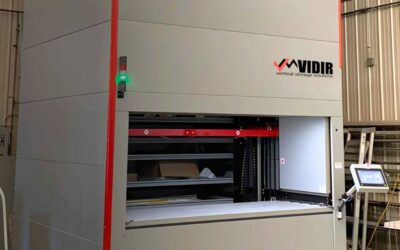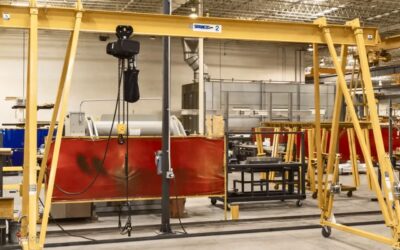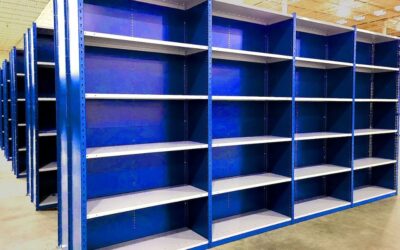The Advantages of Warehouse Overhead Cranes Over Forklifts

Within an industrial warehouse, workers will typically use heavy-duty equipment to expedite tasks and work efficiently during their shift. While forklifts have long been a staple in warehouses, many operations are recognizing that overhead cranes offer additional benefits in certain scenarios. Learn more about the advantages of warehouse overhead cranes over forklifts and how these systems promote a safe and efficient workspace for employees.
Understanding the Basics of Overhead Cranes and Forklifts
To carefully handle sensitive and heavy products, warehouse employees must use high-quality equipment and operate these systems with care. Both overhead cranes and forklifts are useful in warehouse environments, but they work best in specific circumstances.
Characteristics of Overhead Cranes
Overhead cranes are material handling systems consisting of hoists and trolleys mounted on girders. They move heavy and bulky items horizontally across a predetermined path for easy transport. Many professionals install these systems within the structure of a warehouse, and they can operate this machinery either manually or through automation. Their lifting capacities allow businesses to transfer tons of material effortlessly.
Characteristics of Forklifts
Forklifts are versatile, mobile material-handling machines equipped with forks to lift, move, and stack goods. Available in various sizes and designs, forklifts are highly maneuverable and often operate under circumstances that require a high degree of flexibility and mobility in small spaces.
However, they struggle with the efficient handling of extremely heavy loads or oversized pieces. Because of this weakness, many businesses will switch to overhead cranes.
How Overhead Cranes Improve Workplace Conditions
There are many tasks in warehouse operations that could compromise the safety of your staff. While forklifts offer utility, they often increase safety risks due to human error and limited visibility. Overhead cranes help reduce the chances of injury when they’re operated properly.
Reduced Collision Risks
Forklifts operate on warehouse floors where potential collisions with personnel, racks, or other equipment are common. Overhead cranes, however, function above the workspace, which eliminates floor traffic and significantly reduces the chance of accidents. This separation creates a safer environment for both operators and laborers.
Enhanced Stability and Control
Overhead cranes provide improved load stability, especially when dealing with uneven or awkwardly shaped materials. Unlike forklifts, which can tip over when handling poorly balanced loads, cranes distribute weight evenly across their structure. This feature creates a safe and efficient transport process across the warehouse.

Cost Efficiency and ROI Analysis
When evaluating any piece of equipment, cost-effectiveness is a priority many warehouse owners will consider. Overhead cranes may require a higher upfront investment, but they offer long-term financial benefits that exceed the capabilities of forklifts. If your budget allows for an upgrade, use this installation as an investment for future success.
Long-Term Savings With Overhead Cranes
All equipment within your warehouse will require routine maintenance. Forklifts require regular maintenance in the form of tire replacements, oil changes, and engine repairs. By comparison, overhead cranes involve fewer moving parts, which results in lower maintenance costs over time.
Alongside their routine maintenance, your equipment may need replacements for larger components or the entire system. The lifespan of forklifts and overhead cranes typically differ, as the durable materials in overhead cranes will last longer than forklifts. This boosts cost efficiency, ensuring better returns on your initial investment.
Energy Efficiency in Daily Operations
Electric overhead cranes are generally more energy-efficient compared to the fuel or battery requirements for forklifts. This efficiency reduces operational costs while offering an added benefit of lower emissions. If your facility follows eco-friendly practices, warehouse overhead cranes have an advantage over forklifts in this area.
Improved Productivity With Overhead Cranes
Boosting productivity increases the revenue and the reputation of your warehouse operations. While forklifts are effective for certain tasks, overhead cranes often outperform when it comes to speed and precision.
Handling Larger Loads in Less Time
Many warehouses store heavy loads that are difficult for humans to grab without equipment. Overhead cranes provide the necessary strength that forklifts may struggle to handle. With higher weight capacities, cranes eliminate the need for splitting loads or making multiple trips and speed up operations without compromising worker safety.
Simplifying Workflows With Automation
Many overhead crane systems support the advanced automation features located in industrial warehouses. By integrating AI controls or remote handling systems, warehouses can optimize workflows to improve both precision and efficiency. Forklifts, on the other hand, are fully reliant on human operation, which limits automation capabilities.

Space Optimization in Warehouse Layouts
To make room for sorting, deliveries, and other tasks in the warehouse, it’s important for managers to optimize the workspace for their employees. Overhead cranes positively impact spatial efficiency in ways forklifts cannot match.
Eliminating Clutter From the Floor
Overhead cranes utilize the ceiling structure of a warehouse, freeing up valuable floor space for other operations. Instead of maneuvering forklifts within narrow aisles, cranes can move materials directly from above. This contributes to a more streamlined and organized warehouse.
Flexible Layout Configurations
Overhead crane systems allow customized installations tailored to your specific operational needs, including monorails, gantry cranes, or bridge cranes. These configurations maximize operational flexibility and make it easier to design efficient workflows in your space.
Reduced Downtime Through Enhanced Reliability
Every warehouse manager knows the cost of downtime. Delays in transferring goods disrupt the entire supply chain, but fortunately, overhead cranes minimize downtime through their durability and reliability.
Durability Under High Utilization
Managers operate overhead cranes for continuous, heavy-duty use. Forklifts faced with similar demand often encounter breakdowns or require frequent maintenance, which can halt productivity. By using overhead cranes, warehouses reduce interruptions in operations.
Simplified Maintenance Requirements
Routine maintenance for forklifts involves checking the hydraulic systems and performing mechanical repairs. Overhead cranes, by contrast, have fewer components susceptible to wear and tear. Their ability to perform with minimal interruptions provides longer operational lifespans.
Scalability for Growing Warehouses
Warehouses experiencing growth or increased demand need adaptable solutions. To grow your warehouse effectively, overhead cranes excel in meeting evolving needs through scalable designs.
Expansion-Friendly Adaptations
If you need to upgrade or expand your facility, many overhead cranes accommodate increased load requirements, wider operational areas, and higher levels of automation. For growing warehouses, this scalability delivers long-term convenience that improves your business’s productivity.
Supporting Broader Operational Needs
Whether your warehouse handles heavy manufacturing components or fragile materials requiring precise handling, overhead crane systems are versatile enough to meet these specific demands. Forklifts, on the other hand, are often unable to scale in this way.
If you’re ready to make the switch, explore your options and install a warehouse crane system that works for your business by collaborating with Warehouse Solutions. Your investment in better material-handling equipment will lead to advancements in safety, productivity, and overall success for your warehouse operations.
Latest Blogs
Why Vertical Lift Modules Are Key for High-Density Storage
To keep your storage facility organized and operating efficiently, find out how investing in a vertical lift module will benefit your company’s workflow.
Why Vertical Lift Modules Are Key for High-Density Storage
To keep your storage facility organized and operating efficiently, find out how investing in a vertical lift module will benefit your company’s workflow.
How To Maximize Productivity With Workstation Bridge Cranes
Looking to boost productivity amongst your staff? Improve your warehouse’s work environment by implementing workstation bridge cranes with these tips.
How Modular Cabinets Enhance Warehouse Inventory Control
For more flexibility and management in your warehouse, discover how modular cabinets can improve workflow and inventory control with these features.
Questions?
Let’s Chat About Your Warehouse Project Today!
Or all us at 515-635-1555
Save time. We will contact you
Provide your details, and we’ll help you find exactly what you need


